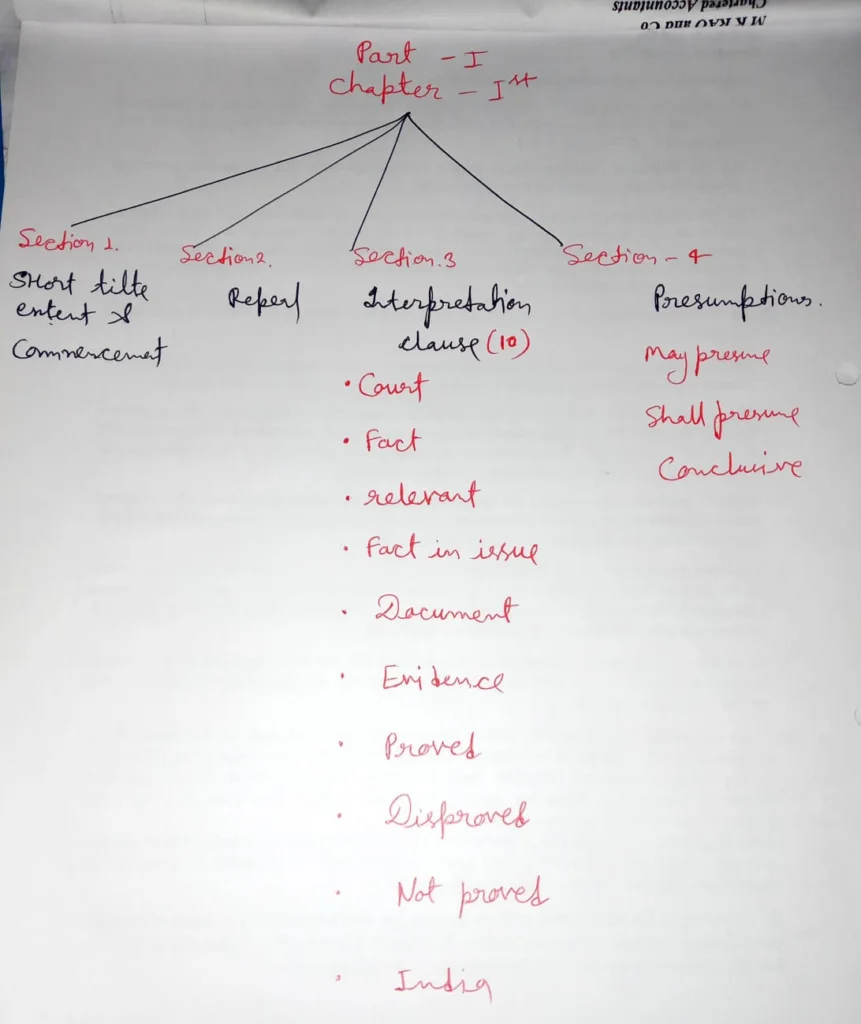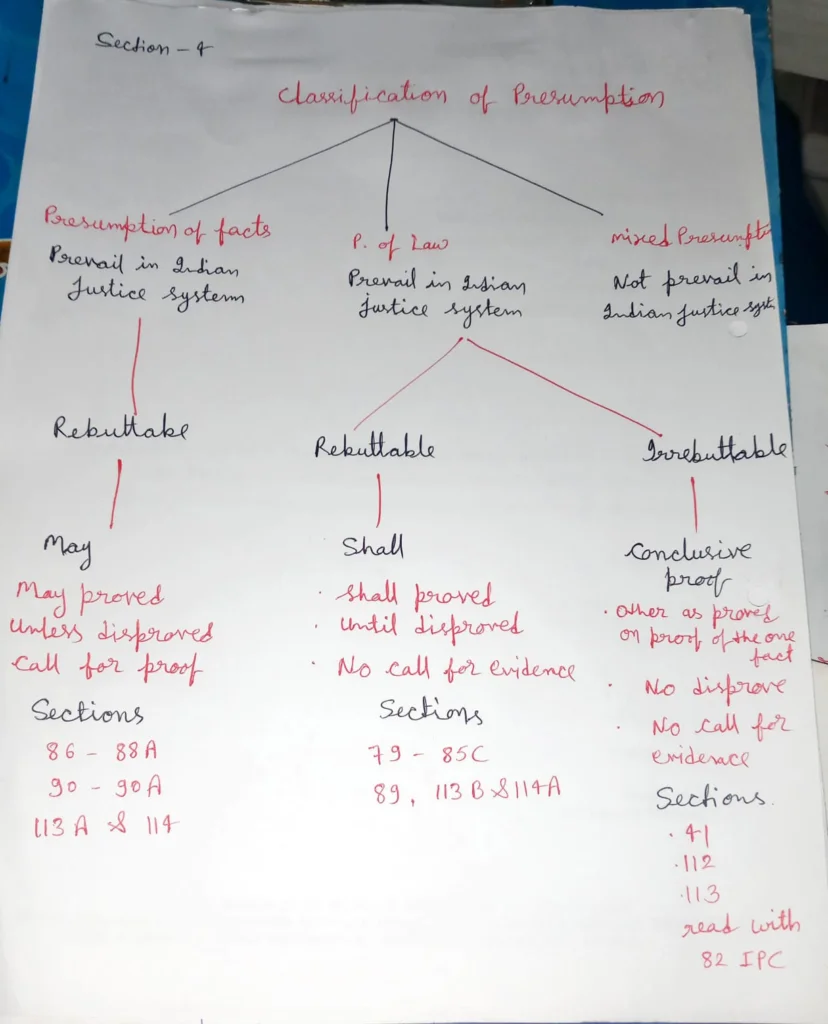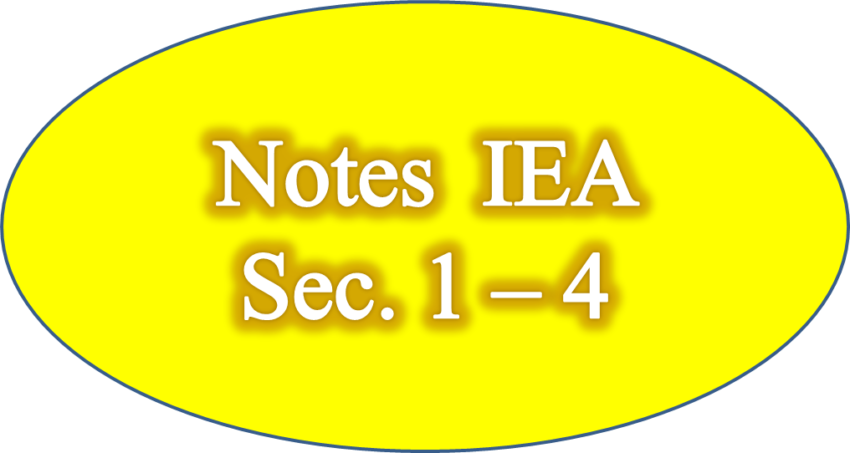Indian Evidence Act Preliminary
Indian Evidence Act Chapter – 1 Preliminary Sec. 1 – 4

Section -1 Short Title, Extent and Commencement
Short title. –– This Act may be called the Indian Evidence Act, 1872.
Extent. ––
- It extends to the whole of India.
( including J & K by the J & K Reorganisation Act, 2019 w.e.f. 31-10-2019)
- The Act applies to all judicial proceedings in a court including court martials other than courts martial convened under the Army Act, the Naval Discipline Act, the Air force Act
- It does not apply on affidavits presented to any Court or Officer and to any proceedings before arbitrator.
* (judicial proceedings are those in which in inquiry there is obligation to take evidence from both sides, to hear both sides and to formulate judgement by the use of discretion). It includes “inquiry” and “trial” but not investigation.
*(Administrative Proceedings An administrative proceeding is a non-judicial way of determining guilt or misconduct and it sometimes includes several kinds of sanctions. For instance, a department that regulates the operation of motor vehicles, air pollution, forestry practises, or real estate sales agents) may fine people or businesses or revoke their licences or permits if they commit acts that are found to be against operating, permitting, reporting, or other rules.
Commencement of Act.––
- The Act came into force on September 1, 1872.
MCQ
Q. 1 Indian Evidence Act was Drafted by – Sir James Fitz- James Stephen
Q. 2 Law of Evidence consist of– Legal rules of Evidence
Q.3 Law of Evidence is – Adjective Law
Q.4 Law of Evidence is applicble to – Both Criminal and Civil Law
Q. 5 Indian Evidence Act applies to – Judicial Proceedings in Courts.
Q.6 Law of Evidence is – Lex Fori
Q. 7 Evidence under the Indian Evidence Act means and includes –Oral and documentary Evidences both
Section -2 [Repeal of enactments.] ––
Rep. by the Repealing Act, 1938 (1 of 1938), s. 2 and Schedule.
Interpretation Clause of Definition Clause in Indian Evidence Act
Section – 3. Interpretation-clause.––
In this Act the following words and expressions are used in the following senses, unless a contrary intention appears from the context: ––
“Court”.–
–“Court” includes all Judges (Higher to lower court) and Magistrates (Like Executive Magistrate, District Magistrate) , and all persons legally authorized to take evidence (Commission authorised by court) except arbitrators .
This definition is not exhaustive
In Case of State of M.P. v. Anshuman Shukla
It was held that if arbitration tribunal has power to take evidence by authorities then it may be court also.
Authorities under the MP Madhyastham Adhiniyam, 1983 have been held to be a court.
Raghu Singh v Burrakur Coal Co. Ltd, AIR 1966 Cal 504.
An Industrial Tribunal set up under section 7 of the Industrial Disputes Act is a Court.
“Fact”.––
“Fact” means and includes ––
- anything,
state of things, or
relation of things which is capable of being perceived (feel) by the senses;These are known external (Physical) Facts.
(2) any mental condition of which any person is conscious. This is known as internal fact ( Psycological) Fact. This is something regarding which a person is mentally consious only, which cannot be physical observed.
Illustrations
- That there are certain objects arranged in a certain order in a certain place, is a fact.( External Fact)
- That a man heard or saw something, is a fact. ( External Fact)
- That a man said certain words, is a fact. ( External Fact)for a particular case
- That a man holds a certain opinion ( Internal Fact), has a certain intention (Internal Fact), acts in good faith or fraudulently, or uses a particular word in a particular sense, or is or was at a specified time conscious of a particular sensation, is a fact. (Internal Fact)
- That a man has a certain reputation, is a fact. (Internal Fact)
“Matter of Fact” is anything which is the subject of testimony.
“Relevant”. ––
One fact is said to be relevant to another when the one is connected with the other in any of the ways referred to in the provisions of this Act relating to the relevancy of facts which are provided u/s 6 -55.
( Provisions 6-55)
Differences between Admissibility ( method by which relevant fact is proved) and relevancy
| Admissibility | Relevancy |
| Admissibility is not based on logic it is based on rule of law | whereas relevancy is based on logical reason and probativity |
| Admissibility is described after Sec. 56 of IEA 1872 | whereas relevancy is provided u/s 6- 55. |
| Rules of admissibility declares whether certain types of evidence are admissible or not | whereas Rules of relevancy declares whether the fact is relevant or irrelevant. |
| In admissibility-The process through which relevant evidence is admitted into court is known as admissibility. | In Relevancy – The relevant facts are those that can be proven and are therefore considered to be admissible under the relevant rules. |
| The facts which are admissible are not always relevant | The facts which are relevant are not always admissible |
Rlevancy of fact is question of law.
What is stage for raising objection for relevancy of fact.- Any stage of suit
Case – Ram bihari yadav v. State of bihar AIR 1998 IMP.
SC observed the expression Relevancy & admissibility-they are used as a similar but their legal applications are different.
Ex.-Communication Sec. 122 of IEA –made by spouse during marriage may be relevant in any case but not admissible
-Communication- b/w an advocate and his client may be relevant in any case but not admissible
Case – R. v. Richardson regarding relevancy of facts
“Facts in issue”.––
The expression “facts in issue” means and includes ––
any fact from which, either by itself or in connection with other facts, the existence, non-existence, nature or extent of any right, liability, or disability, asserted or denied in any suit or proceeding, necessarily follows.
Elements –
- Fact should be in dispute b/w the parties
- Fact should touch the questions of rights or liabilities
- Fact in issue depends upon the ingredients of the offence & state of parties pleadings
Explanation. ––Whenever, under the provisions of the law for the time being in force relating to Civil Procedure, any Court records an issue of fact, the fact to be asserted or denied in the answer to such issue, is a fact in issue.
Illustrations
A is accused of the murder of B.
At his trial the following facts may be in issue: ––
That A caused B’s death;
That A intended to cause B’s death;
That A had received grave and sudden provocation from B;
That A, at the time of doing the act which caused B’s death, was, by reason of unsoundness of mind, incapable of knowing its nature.
- Thus ‘Facts in issue’ are those facts which are in question or those facts which need to be proved for the purpose of ascertaining some information and making inferences out of relevant information in the case in obtaining justice.
- ‘Facts in issue’ are those facts out of which some legal right and liability or disability, involved in inquiry, necessarily arises and upon which, accordingly, decision must be arrived at.
- Matter which are affirmed by one party to suit and denied by the other may be denominated facts in issue. What facts are in issue in particular cases, is a question to be determined by the substantive law or in some cases by the branch of the law of procedure which regulates the law of pleadings, civil or criminal.
Criminal Cases –
The allegation in charge sheet constitute Fact in issue (The charge constitutes and includes ‘facts in issue’ Ch. 17 of the CrPC).
Civil Cases–
‘facts in issue’ are determined by the process of framing issues. Order 14 ,rr 1-7, CPC.
“Document”. ––
“Document” means any matter expressed or described upon any substance by means of letters, figures or marks, or by more than one of those means, intended to be used, or which may be used, for the purpose of recording that matter.
Similar to the definition in Sec. 29 of IPC.
Thus All Material Substances on which the thoughts of men are represented by writing, or any other species of conventional mark or symbol may be a document.
Illustrations
- A writing is a document;
- Words printed lithographed or photographed are documents;
- A map or plan is a document;
- An inscription on a metal plate or stone is a document;
- A caricature is a document.
“Evidence”. ––
“Evidence” means and includes ––
- all statements which the Court permits or requires to be made before it by witnesses under inquiry in relation to matters of facts, such statements are called oral evidence;
- all documents including electronic records produced for the inspection of the Court, such documents are called documentary evidence.
The definition of evidence covers the evidence of witnesses and documentary evidence. Evidence can be both oral and documentary and electronic records can be produced as evidence.
“Proved”.
–– A fact is said to be proved when, after considering the matters before court, the court either believes it to exist,
or considers its existence so probable that a prudent man ought, under the circumstances of the particular case, to act upon the supposition that it exists.
“Disproved”.
–– A fact is said to be disproved when, after considering the matters before it, the Court either believes that it does not exist,
or considers its non-existence so probable that a prudent man ought, under the circumstances of the particular case, to act upon the supposition that it does not exist.
“Not proved”. ––
A fact is said not to be proved when it is neither proved nor disproved.
[“India”. ––
“India” means the territory of India excluding the State of Jammu and Kashmir.]
But by J&K reorganisation act Jammu & Kashmir has been included in India from 31st Oct. 2019.
[the expressions “Certifying Authority”, “[electronic signature]”, [(Electronic Signature Certificate], “electronic form”, “electronic records”, “information”, “secure electronic record”, “secure digital signature” and “subscriber” shall have the meanings respectively assigned to them in the Information Technology Act, 2000 (21 of 2000).]
MCQ
Q. 1 An inscription on a metal plate or stone is a –Document
Q. 2 In relation to the expression defined u/s 3 of IEA, Which of the following statements is not correct?
- Fact includes not only physical facts but also psycological facts.
- Court includes arbitrators
- An inscription on a stone is a document
- A fact is said to be “ not proved” when it is neither proved nor disproved.
Q. 3 Evidence may be given in any suit or proceedings of the existence or non- existence
- Fact in issue
- Relevant fact
- Both
- Collateral
Q. 4 A is accused of B’s murder. Which of the following will not be a ‘fact in issue’-
- A’s beating B with a club
- A’s causing B’s death by such beating
- A’s intention to cause B’s death
- A’s going to filed with a club
Q.5 A Relevant Fact must be
- Logically Relevant
- Legally Relevant
- Both\
- None
Section – 4
“Presumption”means Affirmative or Negative inference which is basically drawn about the truth or falsehood of a doubtful fact by the court.
In general, It is a process of ascertaining the few facts on the basis of possibility.
General Classification-
Presumption is devided in three parts-
Presumption of facts- It is also known as natural or material Presumption of facts and prevail in Indian justice system.
Those inferences which are naturally & reasonably concluded on the basis of observations and circumtances in the courses of human conduct.
Presumption of Law – It is known as artificial Presumption of facts and prevail in Indian justice system.
They are of compulsory nature which are concluded by court with respect to the existence of certain facts.
Mixed Presumption- It consist of blend of both presumptions and doesn’t prevail in indian justice system reflects in english law..
Presumption of Law is of two types-
Rebuttable Presumption –Which can be overthrown by evidence to the contrary.(May Presume and shall presume) come in this category.
Irrebuttable Presumption – Which can not be ruled out by any additional argument or evidence and also known as conclusive proof. (conclusive proof) come in this category.
Differences b/w Presumption of facts & Presumption of Law
Differences b/w Presumption of facts & Presumption of Law
| Presumption of facts | Presumption of Law |
| Presumption of fact is based on logic, human. | Presumption of law is based on provisions of law. |
| Presumption of fact are uncertain | Whereas Presumption of Law is certain & uniform. |
| Presumption of fact is rebuttable and disappears when explained or rebutted by production of positive proof. | whereas Presumption of Law is conclusive if not rebutted as required by the rule providing support for it, like this it may be rebuttable or irrebuttable |
| Presumption of fact is discretionary presumptions, meaning that the Court may use its discretion in establishing them. | whereas Presumption of Law is mandatory and Courthas not own discretionary power, the court is required to establish it. |
| Presumptions of facts derive on the basis of natural law, Customary law, mankind experience etc. | Presumptions of facts derive on the basis of judicial & custom practice and law under statutes. |
| Presumption of facts can be ignored by the court however it is strong. | Presumption of law cannot be ignored by the court. |
Section – 4

“May presume”. Discretionary nature
- Whenever it is provided by this Act that the Court may presume a fact,
- it may either regard such fact as proved, unless and until it is disproved,
- or may call for proof of it.
Sections in court may presume
- 86. Presumption as to certified copies of foreign judicial records.
- 87. Presumption as to books, maps and charts.
- 88. Presumption as to telegraphic messages.
- 88A. Presumption as to electronic messages.
- 90. Presumption as to documents thirty years old.
- 90A. Presumption as to electronic records five years old.
- 113A. Presumption as to abetment of suicide by a married woman.
- 114. Court may presume existence of certain facts.
Emperor vs. Shrinivas, (1905) 7 Bom LR 969. A Court , where it “may presume” a fact, has a discretion to presume it as proved, or to call for confirmatory evidence of it, as the circumstances require. In such a case the presumption is not a hard and fast presumption, incapable of rebuttable, a presumptio juris et de jure ( conclusive presumptions of law which cannot be rebutted by evidence.
For an example-If a man possess some stolen goods after the theft then it is believed that he either a thief or he has received the goods knowing the nature of goods stolen unless he account for the possession.
“Shall presume”. Mandatory Nature
- Whenever it is directed by this Act that the Court shall presume a fact,
- it shall regard such fact as proved, unless and until it is disproved.
Sections in court shall presume
- 79. Presumption as to genuineness of certified copies.
- 80. Presumption as to documents produced as record of evidence.
- 81. Presumption as to Gazettes, newspapers, private Acts of Parliament and other documents.
- 81A. Presumption as to Gazettes in electronic forms.
- 82. Presumption as to document admissible in England without proof of seal or signature.
- 83. Presumption as to maps or plans made by authority of Government.
- 84. Presumption as to collections of laws and reports of decisions.
- 85. Presumptions as to powers-of-attorney.
- 85A. Presumption as to electronic agreements.
- 85B. Presumption as to electronic records and electronic signatures.
- 85C. Presumption as to Electronic Signature Certificates.
- 89. Presumption as to due execution, etc., of documents not produced.
- 113B. Presumption as to dowry death.
- 114A. Presumption as to absence of consent in certain prosecution for rape
In Case in which a court shall presume a fact, the presumption is not conclusive but rebuttable.
Rebutable presumption is of good quality as they does not lose their quality until proven contrary to presumption
“Conclusive proof”.
- When one fact is declared by this Act to be conclusive proof of another,
- the Court shall, on proof of the one fact, regard the other as proved,
- and shall not allow evidence to be given for the purpose of disproving it.
Irrebutable presumption cannot be ruled out by any additional probative evidence
Court in its consideration shall regard all other facts to be proved only if one fact of the case is proven without any reasonable doubt.
Sections
- 41. Relevancy of certain judgments in probate, etc., jurisdiction.
- 112. Birth during marriage, conclusive proof of legitimacy.
- 113. Proof of cession of territory.
Read with 82 IPC
Cases –
Gitika Bagechi vs. Subhabrota Bagechi, AIR 1966 Cal 246. Where husband & Wife were in love and led an amorous life for about eight years before their marriage, both were sound in health and mind and after marriage lived together in a room for months together and had privacy, the presumption was conclusive that consummation of marriage was an accomplished fact.
KV Baby vs. Food Inspector, wadakkanchery, 1994 CrLJ 3421, The Certificate issued by the Director of Central Food Laboratory is conclusive proof of facts stated therein. Examination of the Director as witness is not permissible.
Shanti v. State of Haryana It was held that if one fact of the case is proven without any reasonable doubt all other facts to be proved
Tukaram v. State of Maharashtra (1979) It was held that the presumption are most helpful for victims but also for justice sustem to deliver justice quickley and whole society.
- CrPC
- Jurisprudence Notes
- IPC Notes
- Constitution of India
- Evidence Act

